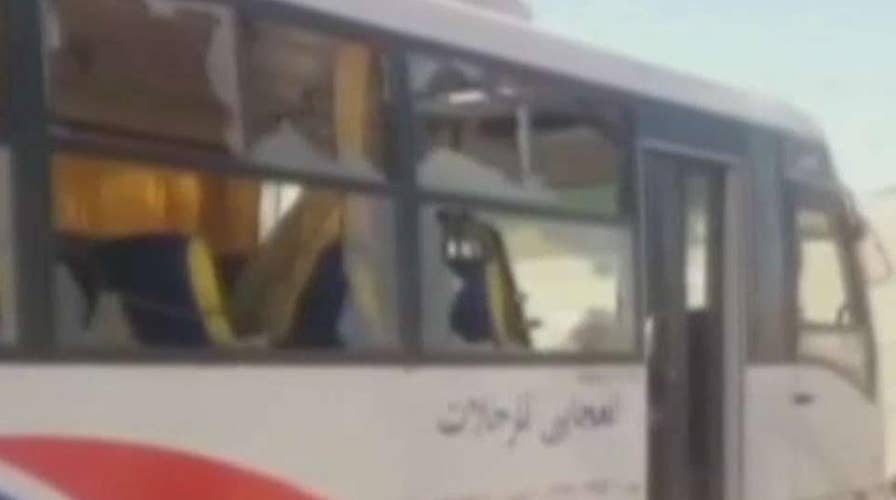Masked gunmen ambush caravan of Coptic Christians in Egypt
Victims were on their way to visit a monastery to pray when they were attacked outside Cairo; Conor Powell reports from Jerusalem
The first thing I read on Friday morning was that 28 Egyptians in the Sinai had been murdered by terrorists, with more than 20 others wounded. And my first thought was clear and to the point:
Maybe this will finally wake up the Egyptian authorities.
The grisly attack, carried out with firearms, took place on an isolated road in the Sinai desert – a sparsely populated region of Egypt where some believe ISIS is setting up a new base of operations in the wake of their losses in Iraq and Egypt.
The victims belonged to a church group of Coptic Christians and many of them were children. They were on their way to pray at the Monastery of St. Samuel the Confessor.
The victims belonged to a church group of Coptic Christians and many of them were children. They were on their way to pray at the Monastery of St. Samuel the Confessor.
Coptic scholar Samuel Tadros described the scene in the New York Times, “The terrorists waited on the road like game hunters. Coming their way were three buses, one with Sunday school children. Only three of them survived. Their victims were asked to recite the Islamic declaration of faith before being shot.”
Of course it wasn’t the first attack on Egypt’s Christians this year. It seems like just yesterday when, on Palm Sunday, two Cairo churches were bombed, and during those twin assaults a total of 45 people were killed and 126 injured.
Maybe this will finally wake up the Egyptian authorities, I remember thinking at the time.
In March, just weeks before, and again in Sinai, hundreds of Christian families fled their homes after ISIS threatened to slaughter them. And it wasn’t an idle threat – seven Christian men were found dead, their bodies discarded along roadways like so much trash.
Last year was no better. In May 2016, I wrote, “A riot – based on a salacious rumor – led to ferocious violence against a Coptic family in El-Karm, located in Egypt’s southern province of Minya. Some 300 raging Islamists stripped a 70-year-old mother naked and paraded her, shamed and weeping, through the streets of her hometown, while torching seven Christian houses.
“Then on December 11, a suicide bomber attacked St. Peter and St. Paul Coptic Orthodox Church in Cairo, killing 29 and injured dozens.”
At the time MEMRI reported, “Jihadis took to social media to express their satisfaction, even before any organization claimed responsibility. Many ISIS supporters shared posts on social media … explaining why Egypt’s Coptic Christians deserve punishment, while others vowed that Egyptian Christians will either be expelled or slaughtered.”
ISIS has since identified Christians as their “favorite prey.”
After the murder of Sinai’s Christian children on Friday morning, and perhaps due to President Donald Trump’s recent demands that Arab countries aggressively rein in their terrorists, Fox News reported:
“Egypt's military fought back against the attackers who stormed a bus full of Coptic Christians and killed 28 people on their way to a monastery to pray, President Abdel-Fattah el-Sissi said Friday.”
“The Egyptian military struck bases where the attackers had trained, the president said without elaborating. No group immediately claimed responsibility for the attack, but Egypt’s Coptic Christians have become the preferred target of the Islamic State in the region.”
Is it too much to believe that this most recent bloodshed, particularly targeting children, has finally awakened the Egyptian authorities?
We can hope. And we can certainly pray. But only time will tell.





















